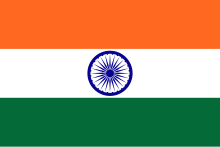Wq/syl/ꠄꠘ꠆ꠒꠤꠀ
 | ꠀꠋꠞꠦꠎ ꠝꠣꠔꠕꠘꠦ ꠅꠘꠥꠛꠣꠖ ꠇꠞꠣꠞ ꠅꠘꠥꠞꠥꠗ ⁕ ꠇꠤꠀꠘꠕꠘꠦ ꠀꠘꠣ ꠅꠁꠍꠦ ꠀꠞ ꠇꠣꠞ ꠇꠣꠞ ꠅꠛꠖꠣꠘ ꠀꠍꠦ ꠁꠔꠣ ꠖꠦꠈꠣꠞ ꠟꠣꠉꠤ en:q:ꠄꠘ꠆ꠒꠤꠀ ꠖꠦꠈꠃꠇ꠆ꠇꠣ ⁕ |
ꠄꠘ꠆ꠒꠤꠀ (ꠃꠌ꠆ꠌꠣꠞꠘ : /enɖia/) ꠅꠚꠤꠡꠤꠀꠟ ꠘꠣꠝ ꠀꠝ ꠝꠣꠘꠥꠅꠞ ꠄꠘ꠆ꠒꠤꠀ (ꠀꠋꠞꠦꠎ ꠝꠣꠔ : Republic of India) ꠘꠣꠁꠟꠦ ꠀꠝ ꠝꠣꠁꠘ꠆ꠡꠞ ꠄꠘ꠆ꠒꠤꠀ ꠅꠁꠟꠉꠤ ꠖꠇ꠆ꠇꠤꠘ ꠄꠡꠤꠀꠞ ꠄꠉꠥ ꠖꠦꠡ ⁕ ꠖꠦꠡꠐꠣꠞ ꠡꠞꠇꠣꠞꠤ ꠘꠣꠝ ꠜꠣꠞꠔꠤꠅ ꠙ꠆ꠞꠎꠣꠔꠘ꠆ꠔ꠆ꠞ ⁕ ꠜꠃꠉꠟꠤꠇ ꠀꠅꠔꠘꠦ ꠁꠈꠐꠣ ꠖꠇ꠆ꠇꠤꠘ ꠄꠡꠤꠀꠞ ꠡꠛ ꠔꠘꠦ ꠛꠠ ꠀꠞ ꠛꠤꠡ꠆ꠡꠦꠞ ꠡꠙ꠆ꠔꠝ ꠛꠠ ꠖꠦꠡ ⁕ ꠅꠁꠘ꠆ꠘꠛꠣꠄ ꠝꠣꠘꠥꠡꠞ ꠛꠤꠌꠣꠞꠦ ꠁꠈꠐꠣ ꠛꠤꠡ꠆ꠡꠦꠞ ꠖꠤꠔꠤꠅ ꠡꠛ ꠔꠣꠇꠤ ꠛꠦꠡꠤ ꠝꠣꠘꠥꠡ ꠔꠔꠣ ꠛꠠ ꠉꠘꠔꠣꠘ꠆ꠔ꠆ꠞꠤꠇ ꠖꠦꠡ ⁕ ꠜꠣꠞꠔꠞ ꠙꠌꠝꠦ ꠖꠤ ꠙꠣꠇꠤꠍ꠆ꠔꠣꠘ ꠃꠔ꠆ꠔꠞ-ꠙꠥꠛꠦ ꠖꠤ ꠌꠤꠘ ꠨ ꠘꠦꠙꠣꠟ ꠨ ꠅ ꠜꠥꠐꠣꠘ ꠀꠞ ꠙꠥꠛꠦ ꠖꠤ ꠛꠣꠋꠟꠣꠖꠦꠡ ꠨ ꠛꠣꠞ꠆ꠝꠣ ꠀꠞ ꠝꠣꠟꠦꠡꠤꠀ ꠞꠁꠍꠦ ⁕

ꠒꠣꠇ
[edit | edit source]The sea borders Hindustan on the east, west and south. In the north, the great mountain ranges separate India from Turan, Iran and China. |
Intelligent men of the past have considered Kabul and Qandahar as the twin gates of Hindustan… By guarding these two places, Hindustan obtains peace from the alien (raider) and global traffic by these two routes can prosper. |
— Abul Fazl in his Akbar Namah (also in Athar Ali, The Evolution of the Perception of India’ in his Mughal India, p. 113-11). also in [1]
The inhabitants of this land are religious, affectionate, hospitable, genial and frank. They are fond of scientific pursuits, inclined to austerity of life, seekers after justice, contented, industrious, capable in affairs, loyal, truthful and constant… They one and all believe in the unity of God, and as to the reverence they pay to the images of stone and wood and the like, which simpletons regard as idolatry, it is not so. |
— Ain-i-Akbari by Abul Fazl. Quoted from Lal, K. S. (1999). Theory and practice of Muslim state in India. New Delhi: Aditya Prakashan. Chapter 2
ꠟꠇ
[edit | edit source]

